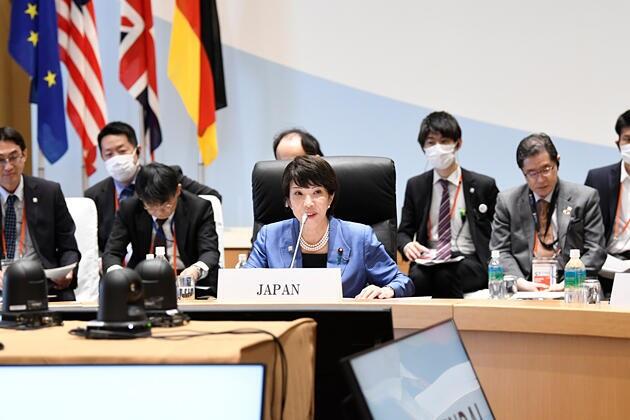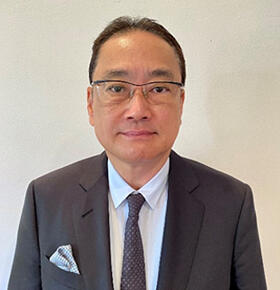The second main agenda item of the G7 Science and Technology Ministers' Meeting in Sendai, was the "Promotion of trustworthy scientific research through research security and research integrity measures." The awareness of the issue expressed in the "G7 Research Compact" adopted and announced at the 2021 Cornwall Summit in the UK was the starting point for discussions within the framework of the G7. The G7 Security and Integrity of the Global Research Ecosystem (SIGRE) Working Group was launched to "develop a common set of principles which, when implemented, will help to protect the research and innovation ecosystem across the G7 from risks to open and reciprocal research collaboration, and preserve the principles of open science and research freedom and independence" (excerpt from the G7 Research Compact); since then, discussions among the G7 have been taking place in this WG under the co-chairmanship of the U.K. and Canada.

(provided by the Cabinet Office)
The G7's focus on this issue was reiterated in the preamble of the Communiqué of the meeting in Sendai1. The preamble mentions, "Some actors may attempt to unfairly exploit or distort the open research environment and misappropriate research results for economic, strategic, geopolitical, or military purposes." Although, in the author's opinion, the subject of the wrongdoing is not directly identified here, the phrase "for strategic, geopolitical, or military purposes" suggests that the act is envisaged as one committed by an entity that goes beyond mere individuals. In the latter part of the Communiqué, the phrase "foreign interference" is found twice, making the envisaged wrongdoers clearer.
The problem seems to be due to the sensitive nature of the information on specific cases; one of the reasons why this is somewhat challenging for the public to understand is that official documents of this kind do not directly inform us what exactly is happening and what the problems are. As can be guessed from the cases reported in the press and others (although there are naturally many more cases that are not public knowledge), for example, inappropriate acquisition of know-how and related information through the employment of foreign talents, espionage and theft of scientific and technological information, or opaque flow of foreign funds are likely to be considered as security risks to research integrity.

(provided by the Cabinet Office)
Working Group Activities
The planned deliverables of the G7 SIGRE/WG discussions and work include (1) G7 "Common Values and Principles" on Research Security and Research Integrity, (2) "G7 Best Practices" for Secure and Open Research Integrity, and (3) an online "Virtual Academy."
The "Common Values and Principles" document was already released at last year's G7 ministerial meeting in Frankfurt2. This document notes that while open and cooperative research is a key principle, there are circumstances in which it is appropriate to set reasonable restrictions or conditions on access to research and related data such as for security reasons. It is also stated, "Some bad-faith actors choose not to respect these justified limits and seek to access and misappropriate knowledge and technology without authorization, and without recognizing or reciprocating the effort of those involved in funding or conducting the work. While such practices are driven by a variety of economic, strategic, geopolitical or military objectives, in all cases, they breach the norms and values underpinning international academic collaboration, undermine the integrity of research, and harm the security and prosperity of our societies. The G7 members oppose these practices."
This document also provided working definitions of "Research Integrity" and "Research Security;" values such as "Academic Freedom," "Freedom from Discrimination, Harassment, and Coercion," "Institutional Autonomy," and "Transparency, Disclosure, and Honesty;" and principles such as "Balancing National and Global Interests," "Maintaining Openness and Research Security," "Collaboration and Dialogue," "Risk Proportionality," and "Accountability and Responsibility," among others.
While "Research Integrity" and "Research Security" are interrelated concepts, the distinction and relationship between them are somewhat challenging for the general public to understand. In brief, "Integrity" can refer to the soundness and fairness of research that should be maintained by the research community. Based on the understanding that the risk of conflicts of interest and responsibility, as well as that of technology and information leakage, may arise, the term "Security" may be used to describe the approach and attitude to deal with such risks.
"G7 Best Practices" is a reference document summarizing voluntary standards of conduct and best practices followed by G7 countries to ensure research security and research integrity. This document was released shortly after the Sendai ministerial meeting3.
Work is ongoing on the "Virtual Academy," which is an attempt to open a framework for exchanging information on best practices across the research community on the basis of an EU platform. Here, the exchange of information and opinions involving not only the government but also the actual research community is crucial to ensure the effectiveness of the tool. As for Japan, experts recommended by the Japan Association of National Universities (JANU) as well as the Science Council of Japan (SCJ) are already participating in discussions to establish this platform. The "Virtual Academy" is expected to be officially launched soon. The G7 countries will firstly open it as a forum for information exchange with access reserved to G7 officials; the possibility of opening it to like-minded countries and others is then to be considered, but the details have not yet been worked out.
"Sharing Values and Principles" as a basis for international research collaboration
Along with the growing recognition of the significance and magnitude of the impact of science, technology and innovation (STI) on the economy and society, there has been a move to strengthen international collaborations in advanced scientific fields. The science and technology section of the G7 Hiroshima Leaders' Communiqué (Paragraph 40) also states, "We further commit to working together with partners sharing common values and principles in research and innovation." and "We are committed to fostering and promoting a common understanding of values and principles in research and innovation through dedicated multilateral dialogues, including in the area of research security and research integrity, and international joint research based on the philosophy of open science," among others. The importance of research collaboration among the G7 countries that share core values and principles was again emphasized. To enable such a move to proceed successfully, it is critically important that the countries are in step with one other in addressing the issue of research security and research integrity. The same paragraph of the G7 Hiroshima Leaders' Communiqué explicitly mentions, "We welcome the forthcoming launch of the G7 Virtual Academy and release of the Best Practices Paper on Research Security and Integrity." This statement is a political and direct acknowledgment and blessing from the G7 leaders for the achievements to be completed through the science and technology ministerial process and the SIGRE/WG.
(Part three.)

(provided by the Cabinet Office)

Profile
Yoshihiro Higuchi
Director for Global Strategic Issues, Japan Science and Technology Agency (JST)
His public service career began at the Ministry of Foreign Affairs (MOFA) in 1987. After studying at the National School of Administration (ENA) in France, he experienced different posts at MOFA relating to the OECD, UN, APEC, Oceania and EU, among others. Served as Director of the First African Division of MOFA and as Director of the Trade Licensing Division of the Ministry of Economy, Trade and Industry (METI). Outside Japan, he has worked for the Permanent Delegation to the OECD (Paris), Embassy in Egypt, UNESCO Secretariat (Paris), Embassies in Cambodia and France (as Minister and Deputy Chief of Mission). Served as Ambassador Extraordinary and Plenipotentiary of Japan to Madagascar and the Union of Comoros from January 2020 until he took up his current position in October 2022.
- 1"We share a growing concern that some actors may attempt to unfairly exploit or distort the open research environment and misappropriate research results for economic, strategic, geopolitical or military purposes. This undermines the principles and values that underpin open, transparent, reciprocal and accountable international research cooperation and the integrity of research and may pose security risks. Addressing this concern should be based on informed decision-making and appropriate risk mitigation measures by G7 and other partners to continuously promote safe, secure and open international cooperation in research and innovation" (excerpt of the preamble from the 2023 G7 Science and Technology Ministers' Communiqué).
- 2"G7 Common Values and Principles on Research Security and Research Integrity":
https://www.bmbf.de/SharedDocs/Downloads/de/2022/220812-g7-sigre-paper.pdf?__blob=publicationFile&v=2
The Executive Summary of this document is included in the Annex to the Communiqué of the 2022 G7 Science Ministers' Meeting.
https://www8.cao.go.jp/cstp/kokusaiteki/g7_2022/220613_g7_annex.pdf - 3G7 BEST PRACTICES FOR SECURE & OPEN RESEARCH
https://www8.cao.go.jp/cstp/kokusaiteki/g7_2023/2023_bestpracticepaper.pdf
Produced by the Science Japan Editorial Team




